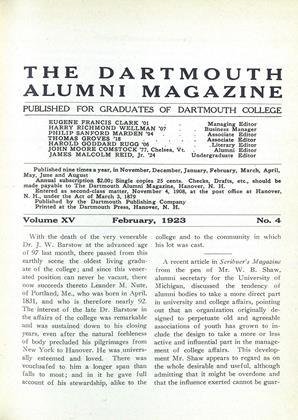The Dartmouth started something when it printed a vigorous editorial reviving the chapel question. Long banked fires leaped into flame and generated much pressure. Following is an extract from the editorial that struck responsive chords, agreeing or disagreeing, in the breasts of all undergraduates: "We confess to a growing irritation at the thought that we are supposed to be getting religion simply because we sign a card 65 times a semester. Religion or love of religion cannot be legislated into a man's makeup. Experience teaches that attempts to do so often bring quite unlooked-for results. And this is especially true when the chapel service is little more than a wasted eight minutes to most men — a necessary evil that is tolerated though not wanted. It would be different if the student body entered into the service with a willing spirit and enthusiasm.
Immediately the editorial offices of TheDartmouth were flooded with offensive and defensive communications. Faculty and undergraduates alike mixed in the affray, hurling many literary brickbats in the heat of the campaign. No question has stirred up such campus-wide interest for a number of years.
Not long after another editorial appeared calling for a straw vote by the undergraduates and defining the issues clearly. The student body was asked to indicate by a vote whether it wished to retain chapel in its present form, whether it wished to abolish chapel, or whether it wanted a longer service with fewer required attendances a semester. In order to outline the main points of the discussion The Dartmouth ran a series of three articles, each stating the case for one of the three propositions. The following are extracts from the articles.
"Morning chapel should be abolished. It has lost its value. It is not wanted by the students, who go only because it is compulsory. What significance it may previously have had when it was regarded in a respectful spirit has been taken away of late years through the intentional indifference of the student body. And no amount of exhortation can effect a change in the attitude of the undergraduates. They are not in sympathy with morning chapel; they regard it as a necessary evil something that must be tolerated though not approved; they simply will not bring themselves to a hypocritical' simulation of interest and respect when they don't feel it."
"The real reason why I favor chapel is that it provides men with the suggestion of things serious; some may be helped in matters of religion. It makes little difference which attitude is taken as long as the student reacts to the point of thinking about himself and others, and of things closely connected with college activities. I defy anyone to say that is not of benefit to every man; and further that such thinking could not be provoked or at least suggested by a morning chapel service attended in the proper spirit. The trouble is with the attitude of the students themselves, not with morning chapel."
"Give chapel a chance, yes; but first make chapel substantial enough to merit the chance. I have not gone into the enlarged order of service that would be arranged; that is better left in the capable hands of Mr. Janeway. I do think that Dartmouth students are willing to give a worthwhile institution a fair chance before condemning it; and that this changed chapel would soon prove itself to be so worthwhile as to merit that respect by the students that must be gained before it can hope to fulfill its proper purposes."
In the vote the undergraduates went on record as follows : for a longer chapel, 646; for abolishing chapel, 507; for the present system, 281. Being voted on at the same time the proposition to do away with the present Thanksgiving holiday and to give two other holidays in the year on appropriate occasions was defeated by a vote of 876 to 539. The voting further showed that 758 men desired to continue the present system of starting classes at 8 o'clock in comparison with 643 in favor of postponing the beginning of the academic day until 8.30.
Though the trustees of the College take no action to change chapel in any way much has been accomplished. After considering the merits of the case, intelligently and not flippantly," nearly four-fifths of those voting advocate a change. More than a third of this group would go so far as to abolish it altogether. But the others believe that the institution, increased in length and given a fresh start and a square deal by the undergraduates, will prove a valuable factor in the life of the College.
If the recent chapel- controversy is looked at as an. indication of the vigorous condition of the spirit of the College one can find cause for good cheer. The nearly 100 percent vote shows that Dartmouth is in good mental health. It is gratifying to note that undergraduate mentalities are sufficiently complex}, so that they can bring themselves actually to doubt an ancient institution like chapel.
 View Full Issue
View Full Issue
More From This Issue
-
 Article
ArticleWith the death of the very venerable
February 1923 -
 Article
ArticleCUTHBERT'S DIARY
February 1923 By EDWIN JULIUS BARTLETT '72 -
 Article
ArticleFRANK SHERWIN STREETER
February 1923 -
 Sports
SportsBASKETBALL
February 1923 -
 Article
ArticleWHY DARTMOUTH?
February 1923 By E. GORDON BILL -
 Class Notes
Class NotesCLASS OF 1911
February 1923 By Nathaniel G., Martha Flagg Emerson, WARREN F. KIMBALL
Article
-
 Article
ArticleAiding 1951 Alumni Fund
May 1951 -
 Article
ArticleShanty demolishers assigned public service projects
OCTOBER • 1986 -
 Article
ArticlePsychology and Mathematics: Three Applications
February 1961 By DONALD C. BUTLER -
 Article
ArticleLaureled Sons of Dartmouth
August 1943 By H. F. W -
 Article
ArticleAle Man
JANUARY 1969 By HAROLD BRAMAN '21 -
 Article
ArticleIn the Belly of a Beast
MARCH | APRIL By Marley Marius ’17


